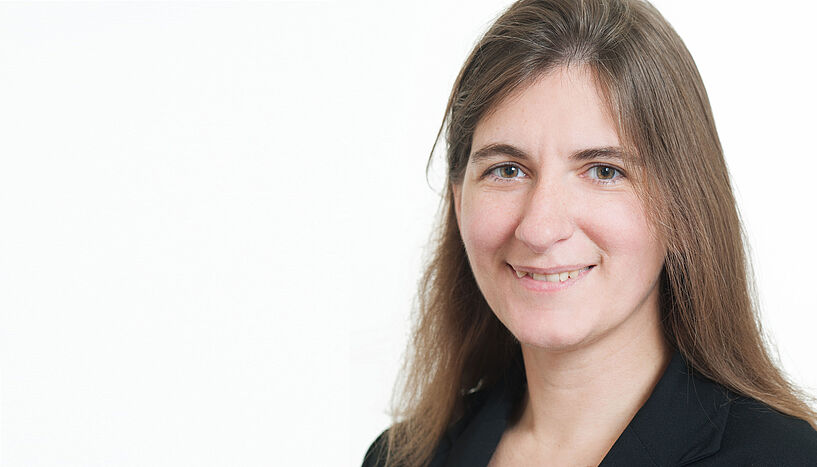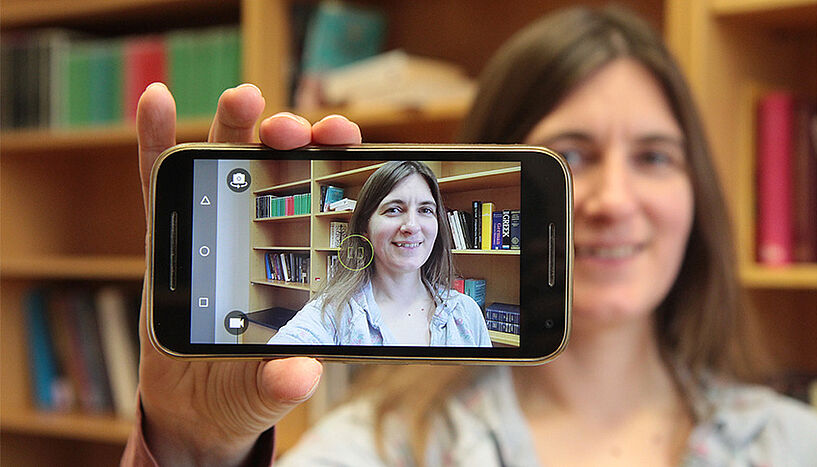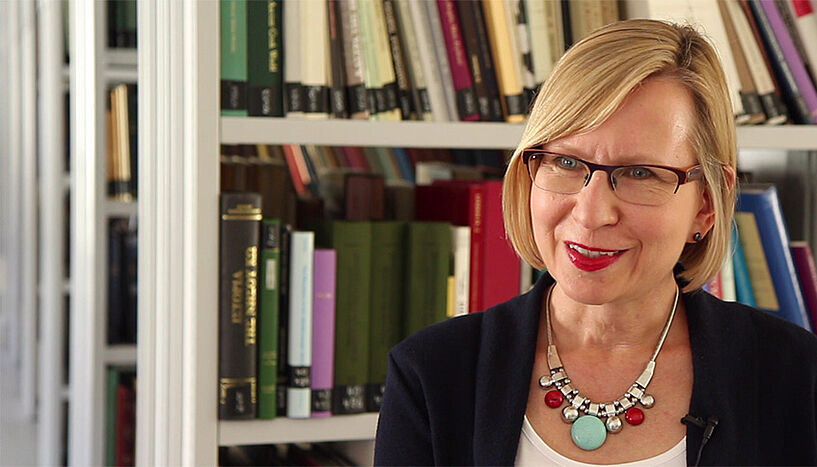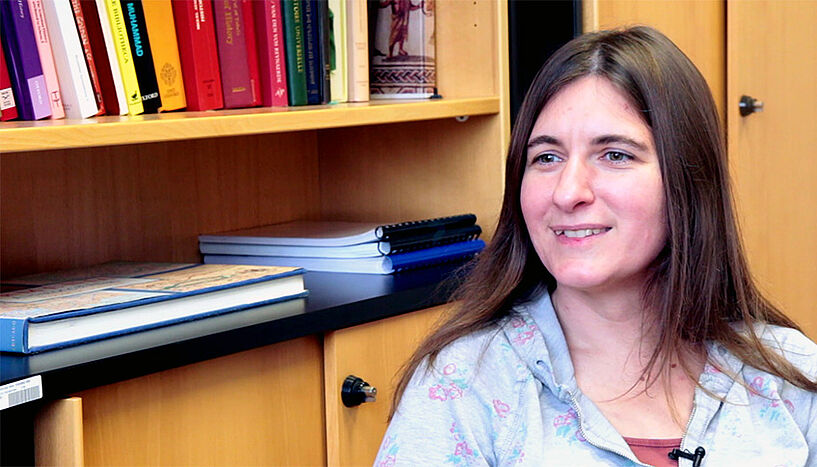Tara Andrews: "That thing called Digital Humanities"
| 04. Oktober 2017
Being on an exchange semester in Greece Tara Andrews got hooked on the Middle Ages, especially on the Byzantine Empire. (Photo: University of Vienna/Barbara Mair )
Combining Humanities with digital tools and methods is the domain of Tara Andrews, Professor of Digital Humanities at the University of Vienna. Her academic career stations include MIT, Oxford, Leuven and Bern. In Vienna she enjoys being part of a large history department.
The academic career of Tara Andrews is not as straightforward as those of most scientists. Starting out at MIT intending to become a computer specialist, she got introduced to humanities. And was hooked. Today she combines the subjects of computers and medieval Near Eastern history, which – as unexpected as it might seem – fit together perfectly.
From MIT to Greece
"Do you really like math and science but think engineering isn't a career for you? Then read on". That was the sentence in a brochure from the MIT that got the attention of Tara Andrews after High School: "My dad said, send that back and let's see how much it costs. So I did. Well, Dad got his question answered, but unfortunately he also got me interested in going there."
Originally Andrews wanted to major in math but decided during her freshman year that this "computer thing was fun" – it was in the mid 1990s when the Internet was booming. Not many people know that MIT also has quite a large humanities requirement. In fulfilling it Tara Andrews got the opportunity to spend a semester in Greece. "There my interest in the Byzantine Empire started. Until then I had the impression that the Middle Ages were full of rats, plagues and inquisitions and just not very nice. Through this class I found out that there was a place in the Middle Ages where they had civilization and baths, and I got really interested in it." When she came back, she knew that she didn't want to return only to computer science, and that's why she finished MIT with a humanities and engineering major.
After the dot.com boom
After her degree Tara Andrews took a job at an Internet company and was "just a normal working person in the dot.com boom". When she lost her job during the dot.com bust, she took the opportunity to go to the University of Oxford to get her master's degree in Byzantine History. "I enjoyed being a student again, especially a humanities student." There she also finished her PhD in 2009 – her thesis laid the groundwork for a digital critical text edition of the 12th century history of Matthew of Edessa – a topic that still fascinates her and on which she has been working ever since. "After my PhD I got a lectureship at Oxford. Once I had the opportunity to stay in the field, I thought, well I will stay as long as someone pays me. And here I am", laughs Andrews: "I knew I wouldn't want to become a researcher within computer science, but I could always imagine it with the humanities."
An unusual combination
Tara Andrews started to combine her computer skills with humanities research at the beginning of her PhD when her supervisor announced to her: "You are going to do a critical edition of this chronicle and it will be a digital edition." This was a challenge for her: "I had to find out what exactly he meant. But I was certainly not going to do a critical edition by hand, no way. So I came up with a bunch of computer methods and tools to make my research easier."
When she got in touch with the Text and Encoding Initiative (TEI), she found out that there was an entire community of people who did similar things; this is when she discovered "that thing called Digital Humanities". And stayed.
Arriving in Vienna
Before coming to Vienna Tara Andrews worked as a postdoc in Leuven, Belgium, followed by an assistant professorship for Digital Humanities in Bern, Switzerland. Then came the opportunity for the professorship at the University of Vienna. This also fit well with her family situation. Her husband decided that ten years working for Google is enough and quit his job in Switzerland, so "we all moved here to Vienna and my husband started to work for the ZID and our daughter just had her first day in the Volksschule this autumn."
For Andrews "Vienna was a really good place to land for me. In Bern they were more interested in my computer skills for digital editions but less interested in my topic, the medieval Christian Near East. But the University of Vienna has a very strong program in Byzantine Studies and related interest in the wider Near East."
The challenge of Digital Humanities
Not only is the University of Vienna a good place for Tara Andrews to do her research projects, but also to bring history students in contact with Digital Humanities and its wide possibilities. "The biggest challenge in teaching Digital Humanities is to convince students not to be afraid of their computers", says Andrews: "You have a disproportionate number of people – both male and female – whose socialization of learning push them towards the humanities instead of towards science. Now I try and teach them about computers. So it's not only a matter of teaching them but also keeping their confidence up."
Research keeps her busy as well. At the moment she has an SNSF-funded project to finish the complete critical digital edition of Matthew of Edessa by 2019, the work that was started for her PhD thesis. "We are doing this all using a graph database model, which is a great experiment to see what kind of data structures work best for complex critical texts."
In another project Tara Andrews is delving into novel digital methods for prosopography, which is the study of individual people within historical sources. "There is obviously a lot of potential for visualization and analyses with these kinds of data structures", she says: "We are focusing on the 50 years before the First Crusade and analyzing the sources. We want to put together as much data as we can to trace and identify cultural networks—who was talking to whom, and who knew about whom." All this with the help of newly developed computer tools and methods of course, "which make my life a lot easier". (td)
Tara Andrews's inaugural lecture "Digital Humanities in the Age of Misinformation" will take place on 19 October 2017 at 17:00 in the Big Ceremonial Chamber, University of Vienna, Universitätsring 1.
Downloads:
Antrittsvorlesung_Andrews_web.pdf
Dateigröße: 278,47 KB



